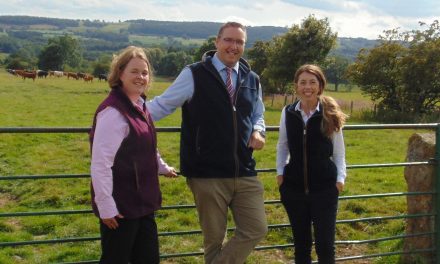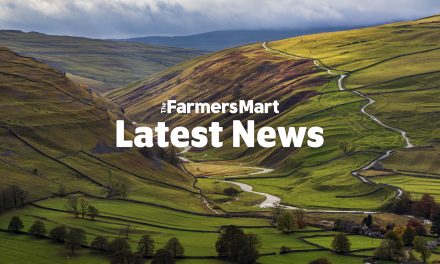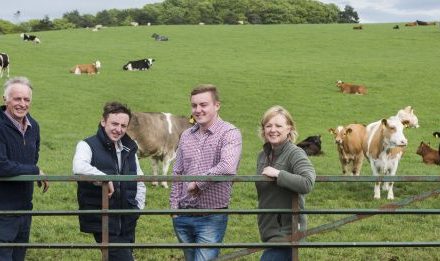Chris Berry talks with new NFU York East county chairman, Andrew Harrison at Rayslack House, West Lutton.
Glyphosate tipped Andrew Harrison’s balance over voting to opt out of the EU last year. He’d been more likely to keep on the ‘remain’ side until then. His vote, like many more, brought about Brexit and in his new position as NFU York East county chairman he’s urging all farmers to come together in order that the best deal can be struck for UK agriculture through the British government – particularly following the General Election.
Andrew runs a mixed arable and livestock enterprise at the tenanted 475-acre Rayslack Farm, between Settrington and West Lutton in Ryedale with his wife, Helen. They have a 10-year old son George. The farm is around 500-550 feet and in the dale bottom 250-300 feet. It isn’t far from the former ADAS experimental farm at High Mowthorpe and he has trial plots at Rayslack. His farming mix also includes contracting for his neighbour across a further 285 acres.

‘Our arable side runs to 390 acres and determines whether we have a good year. It involves 50 per cent of the work and 75 per cent of the income, dependent on price fluctuations of course. We have cattle and pigs on bed and breakfast basis for Packington Pork in Burton on Trent, enabling the arable side to work better. We’ve managed to improve our soil indices with pig and cattle manure. It’s what I’d call grade three running to grade four land in the worse areas that has good, productive soil, provided the season suits it. It’s shallow soil. The topsoil goes from sandy loam to fairly sticky clay loam with an element of flint. If it’s too dry in the spring we suffer.
‘I was around 65/35 towards voting ‘remain’ until somebody in Brussels started playing silly beggars about glyphosate. That tipped me over the edge and I became a ‘leave’ not because I think we shall necessarily be any better outside of the EU, as I don’t know that will be the case and I suspect most of us don’t, but as far as I could see there wasn’t much science behind the reasoning for outlawing its use. Others have put it more eloquently than I but I’ll just say that it’s the sort of nonsense that modern agriculture doesn’t need and flies in the face of everything we’re trying to do.’
Andrew sees the present time as an important period for UK farming to ensure its future and that the NFU is in a pivotal position to bring about right results for British agriculture to move forward.
‘Just at the moment with the potential negotiations for Brexit the NFU is seen by others as the voice of farming, whether those outside of our organisation and within others like it or not that’s the way it is. The government seeks out the NFU to discuss, talk and negotiate. While the NFU still needs to carry on reaching out to those who are not members I really feel that now is the time for everyone in farming to reach out to the NFU, because they won’t have much of a voice on their own. We have an opportunity to galvanise UK farming and achieve a more constructive framework and future if we stand together as one. This is a very unusual period in both politics and world trade. There are many things that need sorting out and my feeling is that we have never had a better chance to get farming’s message across to the authorities in a united manner.’
 Crops grown in the ground this year at Rayslack include winter barley and winter oats growing mainly seed grain. Oilseed rape is not in this time. Andrew runs what he describes as roughly a six-course rotation in blocks of land around the farm that vary from 60-77 acres utilising a break crop, oat crop, often two crops of winter barley and two other crops that can be either spring barley or wheat. He’s using more spring barley this year.
Crops grown in the ground this year at Rayslack include winter barley and winter oats growing mainly seed grain. Oilseed rape is not in this time. Andrew runs what he describes as roughly a six-course rotation in blocks of land around the farm that vary from 60-77 acres utilising a break crop, oat crop, often two crops of winter barley and two other crops that can be either spring barley or wheat. He’s using more spring barley this year.
‘We sowed 140 acres of winter barley variety KWS Orwell for Woodheads at Selby with nine acres down to feed barley; and 60 acres of winter oats for seed using the variety RAGT Lineout plus spring oats for the first time, again going to Woodheads. We’ve 50 acres of seed wheat variety JB Diego and 34 acres of seed spring barley that are going to Mortimer’s in Driffield.
‘Growing nearly everything for seed is something we’ve done before but we don’t always go that way. Last year we had 115 acres of winter wheat with none of it for seed. It means you have to have everything cleaner, field hygiene is a high priority. The only machines that go on our land from away from the farm are a baler and a muck spreader. Every other job is done by us.’
Andrew is catch cropping to fulfil the ‘greening’ requirements of the Farm Payment Scheme. He grows mustard and oats.
‘It works out that we need to have around 67 acres for ‘greening’ measures. Our first year the largest of the individual blocks (77 acres) was given over to catch crops and they worked well.’
Andrew is still a firm believer in the plough’s role in farming, especially at Rayslack, while also committed to one-pass and yield mapping.
‘We plough and then use a one-pass Amazone combination drill. I also have a minimal tillage cultivator which we use occasionally. Up here on our land the plough is relatively easy to use. The techno boffins have been trying to get rid of the plough in farming all my adult life but they haven’t succeeded yet and I don’t think they ever will. We did a bit of a trial a few years ago with a minimal tillage cultivator that required two passes and ploughing. When it came to it the fuel consumption and time involved were similar.’
Trialling is nothing new to Andrew at Rayslack.
‘I’m part of the ADAS High Mowthorpe Farmers Group and we usually have two or three acres of winter barley trial plots for testing chemicals and fertilisers. We get to see what fertiliser rates and chemical regimes work best.’
Andrew buys cattle in as stores at around a year old and sells them a year later, grazing them in the dale that is part of the permanent pasture that makes up the other 85 acres of the farm.
‘We like to buy at Bentham livestock market mainly but also York and Thirsk. We sell mainly deadweight to Dawn Meats in Carnaby and ABP in York. I like the Charolais and Simmental X but often end up with mainly Limousin X. I aim for as high a weight as I can. I used to set my stall out for 450 kilos deadweight but many have reduced their maximum to 400 kilos. I try to find those that will still take 450.
‘The pigs are weaners coming in to us at seven kilos and going on to finishers at 35 kilos. We have anywhere up to 2000 at one time and get batches every eight weeks. Their eventual destination is M&S.’
 Andrew’s grandfather, Edwin Harrison came from Settrington to Rayslack in 1933. Andrew’s late father, Douglas was the youngest of 11 siblings. His mum Barbara (Metcalfe) lives nearby and he has a couple of sisters who live locally.
Andrew’s grandfather, Edwin Harrison came from Settrington to Rayslack in 1933. Andrew’s late father, Douglas was the youngest of 11 siblings. His mum Barbara (Metcalfe) lives nearby and he has a couple of sisters who live locally.
Andrew and Helen got together through the YFC movement. Helen is from Sunk Island in Holderness and was with Patrington YFC. Andrew was with Muston YFC where he is president and a vice president of East Riding County Federation.
‘I particularly liked competing in ploughing and stockjudging, became club chairman three times, county chairman twice and Northern Area chairman. I started getting involved with the NFU in my 30s and have been Malton branch chairman on three occasions. Helen is involved with the local school as a voluntary parent governor and raise funds for it too.’
Surprisngly, given his rural pedigree, Andrew wasn’t initially taken with farming while at school.
‘As an adult I always wanted to be a farmer but there was a period as a kid at school when I quite fancied being a history teacher. I’ve always been fascinated by history. At that time I was more interested in the medieval age but for many years it has been WWII. Whether people realise it or not WWII is there with each and every one of us every day of our lives, particularly the decisions that were made to the end of the war by various allies.’
How fitting it is that Andrew’s tenure as county chairman comes about at another time of great European upheaval.






